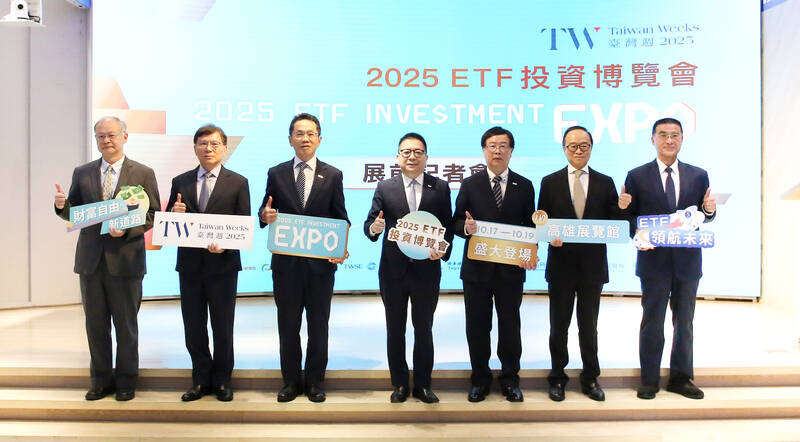The aggregate assets of exchange-traded funds (ETFs) listed in Taiwan as of the end of June had surpassed NT$6.5 trillion (US$216.96 billion), with more than 270 ETFs on the market, the Taiwan Stock Exchange (TWSE) said yesterday at a news conference to promote October’s ETF Investment Expo.
The local ETF market has grown rapidly over the past two decades, becoming the third-largest in Asia, TWSE chairman Sherman Lin (林修銘) said.
Last year alone, the market expanded 65 percent from the previous year, TWSE data showed.

Photo courtesy of the Taiwan Stock Exchange
Last year, the market was about 38 times larger than it was a decade ago, when it was NT$167.1 billion, the data showed.
The number of beneficiaries of the Taiwan ETF market has reached 15.44 million, indicating strong local acceptance and participation in ETF investment, Lin said.
An ETF, which operates like a mutual fund, serves as a type of pooled investment security and typically tracks an index, sector, commodity or other asset.
However, an ETF can also be bought or sold on a stock exchange.
Taiwan’s ETF market has continued to expand in the past few years, with a variety of diversified and thematic investment products for investors across generations and with different needs, Lin said.
Popular products include those that focus on high dividends, artificial intelligence technology, semiconductors, environmental, social and governance sustainability, and electric vehicles, he said.
In particular, the launch of active ETFs and passive multi-asset ETFs is a highlight of this year’s market, he added.
To help the public become familiar with ETF products that suit their needs and the trend of market innovation, this year’s expo at the Kaohsiung Exhibition Center is to feature five special exhibition areas, special lectures, as well as programs for interactive experiences and investment education, the TWSE said.
The event is to run from Oct. 17 to 19, it said.

Sweeping policy changes under US Secretary of Health and Human Services Robert F. Kennedy Jr are having a chilling effect on vaccine makers as anti-vaccine rhetoric has turned into concrete changes in inoculation schedules and recommendations, investors and executives said. The administration of US President Donald Trump has in the past year upended vaccine recommendations, with the country last month ending its longstanding guidance that all children receive inoculations against flu, hepatitis A and other diseases. The unprecedented changes have led to diminished vaccine usage, hurt the investment case for some biotechs, and created a drag that would likely dent revenues and

Global semiconductor stocks advanced yesterday, as comments by Nvidia Corp chief executive officer Jensen Huang (黃仁勳) at Davos, Switzerland, helped reinforce investor enthusiasm for artificial intelligence (AI). Samsung Electronics Co gained as much as 5 percent to an all-time high, helping drive South Korea’s benchmark KOSPI above 5,000 for the first time. That came after the Philadelphia Semiconductor Index rose more than 3 percent to a fresh record on Wednesday, with a boost from Nvidia. The gains came amid broad risk-on trade after US President Donald Trump withdrew his threat of tariffs on some European nations over backing for Greenland. Huang further

CULPRITS: Factors that affected the slip included falling global crude oil prices, wait-and-see consumer attitudes due to US tariffs and a different Lunar New Year holiday schedule Taiwan’s retail sales ended a nine-year growth streak last year, slipping 0.2 percent from a year earlier as uncertainty over US tariff policies affected demand for durable goods, data released on Friday by the Ministry of Economic Affairs showed. Last year’s retail sales totaled NT$4.84 trillion (US$153.27 billion), down about NT$9.5 billion, or 0.2 percent, from 2024. Despite the decline, the figure was still the second-highest annual sales total on record. Ministry statistics department deputy head Chen Yu-fang (陳玉芳) said sales of cars, motorcycles and related products, which accounted for 17.4 percent of total retail rales last year, fell NT$68.1 billion, or

HSBC Bank Taiwan Ltd (匯豐台灣商銀) and the Taiwan High Prosecutors Office recently signed a memorandum of understanding (MOU) to enhance cooperation on the suspicious transaction analysis mechanism. This landmark agreement makes HSBC the first foreign bank in Taiwan to establish such a partnership with the High Prosecutors Office, underscoring its commitment to active anti-fraud initiatives, financial inclusion, and the “Treating Customers Fairly” principle. Through this deep public-private collaboration, both parties aim to co-create a secure financial ecosystem via early warning detection and precise fraud prevention technologies. At the signing ceremony, HSBC Taiwan CEO and head of banking Adam Chen (陳志堅)